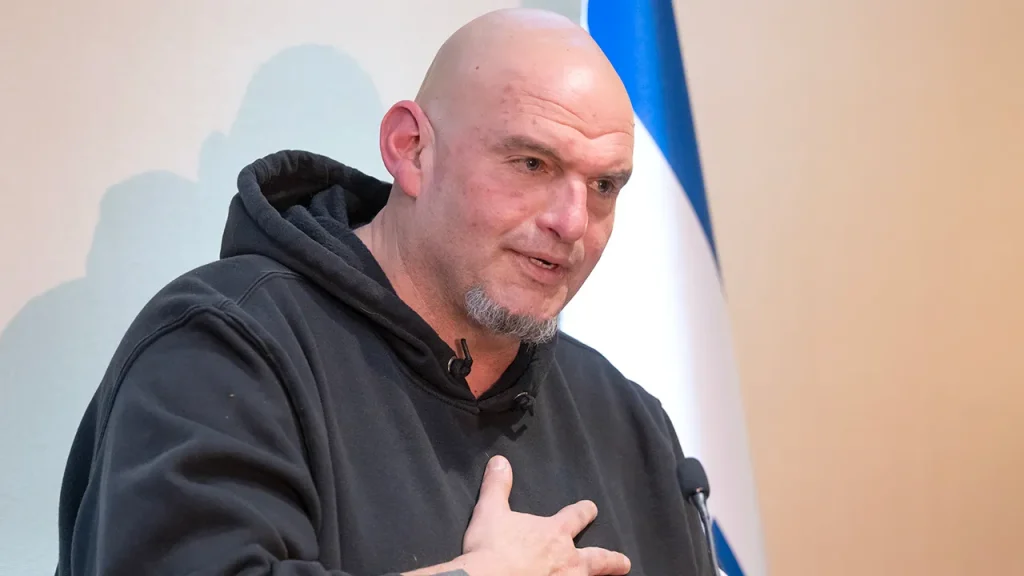Senator Fetterman Calls for Peace in Gaza, Challenges Protesters’ Priorities
In the midst of ongoing tensions in the Middle East, Democratic Senator John Fetterman of Pennsylvania has emerged as an unexpected but steadfast supporter of Israel while simultaneously pushing for peace in the region. His recent statements have highlighted what he perceives as a significant disconnect between pro-Palestinian protesters’ actions and what he believes should be their primary focus: pressuring Hamas to accept a potential peace deal currently being negotiated with support from President Trump. Fetterman’s position represents a notable departure from some voices within his own party, showcasing the complex political landscape surrounding the Israel-Hamas conflict.
“Good morning to everyone except all the protesters who aren’t protesting for Hamas to accept the peace deal,” Fetterman posted on social media, directly challenging the focus of pro-Palestinian demonstrations across America. His criticism extended further when he remarked that these protesters seem to prioritize Hamas over peace itself, noting “No flotilla, blocking a highway or disrupting public events demanding Hamas to take the peace deal.” This perspective highlights Fetterman’s frustration that while many demonstrations have focused on criticizing Israel’s military operations, comparatively little pressure has been directed toward Hamas to end the conflict by accepting terms that would include the release of hostages taken during the October 7, 2023 attack—an attack that involved mass murder, rape, and kidnapping of Israeli civilians, and which precipitated the current war.
The peace negotiations have taken an interesting turn with former President Trump’s involvement, who recently posted on Truth Social that Hamas had declared willingness to negotiate a deal including the release of all hostages, both living and deceased. Fetterman, despite being a Democrat, acknowledged this development with a pragmatic approach: “Politics aside, credit to @POTUS’ peace plan to get to this encouraging point.” This willingness to transcend partisan divides in pursuit of peace reflects Fetterman’s prioritization of humanitarian concerns over political allegiances. Trump himself has expressed optimism about these discussions, noting “positive discussions with Hamas, and Countries from all over the World” while emphasizing that “TIME IS OF THE ESSENCE OR, MASSIVE BLOODSHED WILL FOLLOW—SOMETHING THAT NOBODY WANTS TO SEE!”
As the conflict has progressed, Fetterman has increasingly found himself at odds with certain elements within his own party. In a particularly pointed criticism last month, he accused the Democratic Party of an “ongoing and escalating betrayal of Israel,” firmly rejecting statements from fellow Senate Democrats who had charged Israel with “ethnic cleansing” of Palestinians. “I reject this in the strongest terms. My party’s ongoing and escalating betrayal of Israel is gross and outrageous,” he asserted. This stance positions Fetterman as something of an outlier among progressives, many of whom have been vocal critics of Israel’s military operations in Gaza that have resulted in significant Palestinian civilian casualties.
Fetterman’s position appears to be grounded in a nuanced view that acknowledges both Israel’s right to defend itself following the October 7 attack while also recognizing the urgent need for peace to prevent further suffering on all sides. “Hamas must choose peace or its own destruction. Send the hostages home, now. As an unapologetic supporter of Israel, the Gaza War must end to have peace and security for Israel and Palestinians,” he stated. This balanced approach—supporting Israel’s security concerns while advocating for a swift end to hostilities—sets him apart from more absolutist positions that have dominated much of the public discourse surrounding this conflict.
The senator’s outspoken stance on the Israel-Hamas conflict highlights the challenging political terrain that many elected officials must navigate, particularly within the Democratic Party where positions on this issue vary widely. While Fetterman has faced criticism from some progressive constituents for his unwavering support of Israel, his emphasis on achieving peace through pragmatic means rather than purely ideological positioning offers a window into his broader political philosophy. By focusing attention on concrete steps toward peace—specifically urging Hamas to accept the proposed deal and release hostages—Fetterman has attempted to reframe the conversation away from absolutist rhetoric and toward actionable solutions that might reduce suffering in the region. As negotiations continue and the humanitarian situation remains dire, his call for protesters to redirect their energy toward pressuring Hamas represents a challenge to conventional activism narratives while reinforcing his commitment to finding a path forward in this seemingly intractable conflict.













